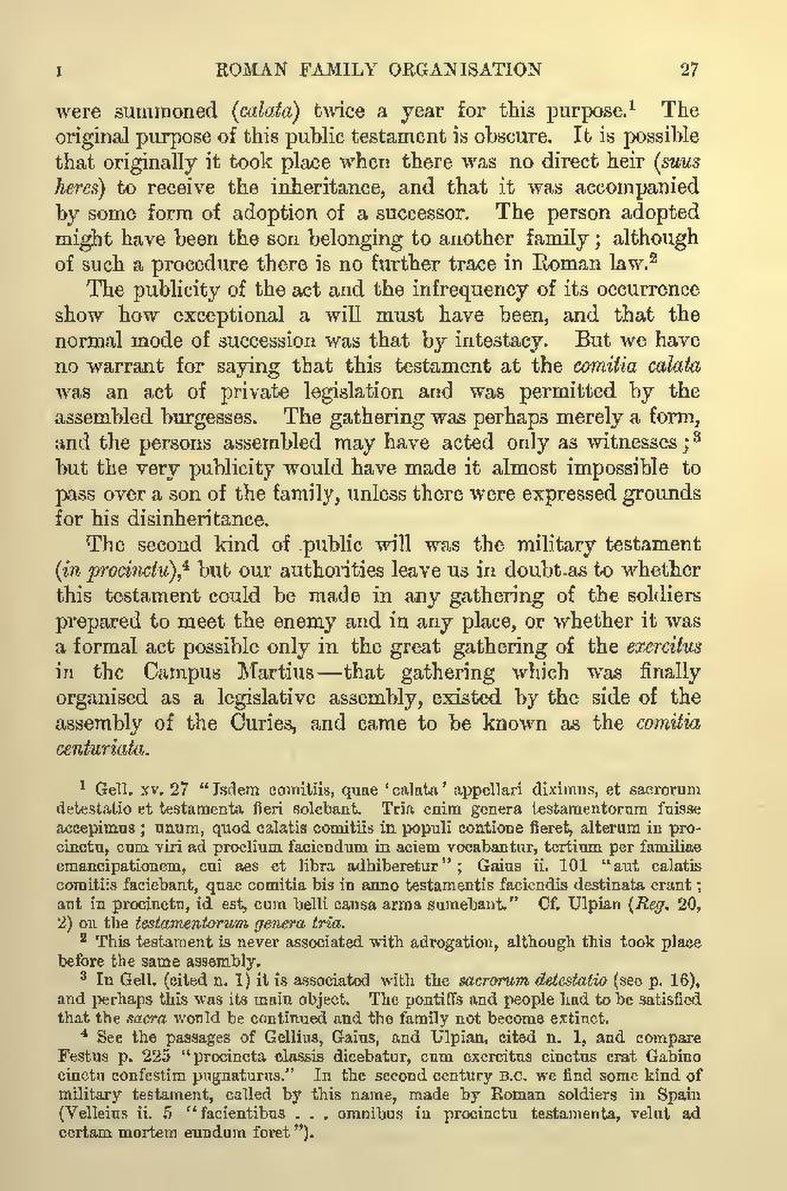were summoned (calata) twice a year for this purpose.[1] The original purpose of this public testament is obscure. It is possible that originally it took place when there was no direct heir (suus heres) to receive the inheritance, and that it was accompanied by some form of adoption of a successor. The person adopted might have been the son belonging to another family; although of such a procedure there is no further trace in Roman law.[2]
The publicity of the act and the infrequency of its occurrence show how exceptional a will must have been, and that the normal mode of succession was that by intestacy. But we have no warrant for saying that this testament at the comitia calata was an act of private legislation and was permitted by the assembled burgesses. The gathering was perhaps merely a form, and the persons assembled may have acted only as witnesses;[3] but the very publicity would have made it almost impossible to pass over a son of the family, unless there were expressed grounds for his disinheritance.
The second kind of public will was the military testament (in procinctu),[4] but our authorities leave us in doubt as to whether this testament could be made in any gathering of the soldiers prepared to meet the enemy and in any place, or whether it was a formal act possible only in the great gathering of the exercitus in the Campus Martius—that gathering which was finally organised as a legislative assembly, existed by the side of the assembly of the Curies, and came to be known as the comitia centuriata.
- ↑ Gell. xv. 27 "Isdem comitiis, quae 'calata' appellari diximus, et sacrorum detestatio et testamenta fieri solebant. Tria enim genera testamentorum fuisse accepimus; unum, quod calatis comitiis in populi contione fieret, alterum in procinctu, cum viri ad proelium faciendum in aciem vocabantur, tertium per familiae emancipationem, cui aes et libra adhiberetur"; Gaius ii. 101 "aut calatis comitiis faciebant, quae comitia bis in anno testamentis faciendis destinata erant; aut in procinctu, id est, cum belli causa arma sumebant." Cf. Ulpian (Reg. 20, 2) on the testamentorum genera tria.
- ↑ This testament is never associated with adrogation, although this took place before the same assembly.
- ↑ In Gell. (cited n. 1) it is associated with the sacrorum detestatio (see p. 16), and perhaps this was its main object. The pontiffs and people had to be satisfied that the sacra would be continued and the family not become extinct.
- ↑ See the passages of Gellius, Gaius, and Ulpian, cited n. 1, and compare Festus p. 225 "procincta classis dicebatur, cum exercitus cinctus erat Gabino cinctu confestim pugnaturus." In the second century B.C. we find some kind of military testament, called by this name, made by Roman soldiers in Spain (Velleius ii. 5 "facientibus . . . omnibus in procinctu testamenta, velut ad certam mortem eundum foret").
